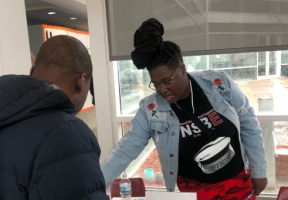By: Princess-India Alexander
 To combat the effects of mass incarceration in their neighborhood, North Lawndale’s BBF Family Services recently held an event that simulated a formerly-incarcerated person’s experience re-entering society.
To combat the effects of mass incarceration in their neighborhood, North Lawndale’s BBF Family Services recently held an event that simulated a formerly-incarcerated person’s experience re-entering society.
Called the “The Comeback: A Formerly Incarcerated Immersion Experience,” the event supports the work of Envisioning Justice, a two-year-old Illinois Humanities initiative that fosters citywide conversations about over-incarceration and strategies that lessen the impact of it.
Sixty people participated in the Feb. 23 simulation, held at BBF Family Services, 1512 S. Pulaski Road, to better understand what it’s like to re-enter one’s community as an ex-offender.
“I think one of the most powerful things that came out of that was just this experiential connection of folks who had never been to the neighborhoods most impacted and that wish well, and folks that are from those neighborhoods and have expertise that is very rarely honored and uplifted,” said attorney and advocate Kulsum Ameji.
Each year, two-thirds of all Illinois prisoners return home to just seven zip codes in the South and West sides of Chicago, including North Lawndale, Pilsen and Bridgeport. Upon return they often find an absence of community and a lack of resources with which to rebuild their lives. As a result, about 43 percent of these individuals return to jail within three years.
Through “The Comeback,” BBF translated these stats into lived experiences and explained the structural barriers stopping former offenders from succeeding once they are released.
Participants were given one of three imaginary offences (felony, misdemeanor and a child-related offense) and sent out to different stations to simulate an ex-offender’s experience applying for an ID, interviewing for a job and getting directions from a parole officer.
Although instructions were given at the beginning, many participants found that the simulation was literally created to be confusing — much like what returning citizens face when released. They had to each visit three stations, but they were given just two “bus passes” to do so. The employment office might have been a requirement, but it was also purposely slow and offered not even an imaginary job. These simulation experiences reinforced the real issues many people face. For example, studies find a strong link between poverty and incarceration, while laws and policies allowing companies not to hire ex-felons put unemployment rates for former offenders at over 27 percent nationwide.
The simulation wrapped up with peace circles facilitated by Circles and Ciphers, an Envisioning Justice hub focusing on healing through open conversation. In these circles participants debriefed about their experiences and discussed what they learned. For many it was an eye-opening exercise, for others it was a moment to spread understanding about their real, lived experiences. “I came today because I’m an ex-offender and I’ve been through this process in a real life experience,” said participant Keiwan Scott. “Doing this [simulation] now is funny to me because it shows other people actually what’s going on.”









